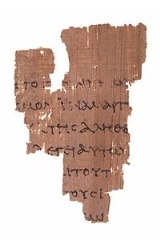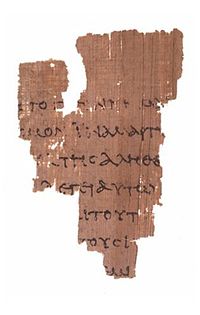
John 18:38
Encyclopedia
John chapter 18, verse 38 of the Gospel of John
, is often referred to as "jesting Pilate
" or "Truth? What is truth?", of Latin Quid est veritas?. In it, Pontius Pilate
questions Jesus
' claim that he is "witness to the truth" (John 18:37).
Following this statement, Pilate proclaims to the masses (lit., "the Jews" referring to the Jewish authorities) that he does not consider Jesus guilty of any crime.
 The exact intention of Pilate has been subject to debate among scholars, with no firm conclusion. His statement may have been made in jest that the trial was a mockery, or he may have actually intended to reflect on the philosophical position that truth
The exact intention of Pilate has been subject to debate among scholars, with no firm conclusion. His statement may have been made in jest that the trial was a mockery, or he may have actually intended to reflect on the philosophical position that truth
is hard to understand. However, regardless of his exact intention in uttering the statement, his action was to ignore the assertion of Jesus that he was the "witness to truth".
This verse reflects the Christian tradition of the "guiltlessness of Jesus" in Pilate's Court
. The innocence of Jesus is important in the Gospel of John, given that it emphasizes Jesus as the Lamb of God
.
Note that Jesus, although he does not respond to Pilate's question (perhaps because Pilate "went out again" before giving him a chance to) believes he knows the answer. During his prayer in Gethsemane
, Jesus tells God
, "Sanctify them through thy truth: thy word is truth." (John 17:17)
In addition to the guiltlessness of Jesus this verse also reflects the rejection of the truth of God: Jesus, the witness to truth was rejected
, ignored and condemned.
and literature
, particularly in that of philosophical
nature. While Pilate's question -- whether intended philosophically, jestfully, or of frustration from not being given a plain answer -- is by no means the first incident of someone questioning the nature of truth, it has been drawn upon many times as a significant occurrence thereof.
Francis Bacon
uses this musing to open his essay "Of Truth", saying that Pilate "would not stay for an answer". He uses this to introduce his theme of truth as an affirmation of faith
.
In The Antichrist
(§ 46), Friedrich Nietzsche
calls upon Pilate's quip. He uses it, however, as evidence of Pilate's character, saying that he is "a solitary figure worthy of honor" and that the question "What is truth" is "the only saying that has any value" in the New Testament
.
Gospel of John
The Gospel According to John , commonly referred to as the Gospel of John or simply John, and often referred to in New Testament scholarship as the Fourth Gospel, is an account of the public ministry of Jesus...
, is often referred to as "jesting Pilate
Pontius Pilate
Pontius Pilatus , known in the English-speaking world as Pontius Pilate , was the fifth Prefect of the Roman province of Judaea, from AD 26–36. He is best known as the judge at Jesus' trial and the man who authorized the crucifixion of Jesus...
" or "Truth? What is truth?", of Latin Quid est veritas?. In it, Pontius Pilate
Pontius Pilate
Pontius Pilatus , known in the English-speaking world as Pontius Pilate , was the fifth Prefect of the Roman province of Judaea, from AD 26–36. He is best known as the judge at Jesus' trial and the man who authorized the crucifixion of Jesus...
questions Jesus
Jesus
Jesus of Nazareth , commonly referred to as Jesus Christ or simply as Jesus or Christ, is the central figure of Christianity...
' claim that he is "witness to the truth" (John 18:37).
Following this statement, Pilate proclaims to the masses (lit., "the Jews" referring to the Jewish authorities) that he does not consider Jesus guilty of any crime.
Text
| SBL Society of Biblical Literature The Society of Biblical Literature, founded 1880, is a constituent society of the American Council of Learned Societies , with the stated mission to "Foster Biblical Scholarship"... GNT SBL Greek New Testament The SBL Greek New Testament or SBLGNT is a critically edited edition of the Greek New Testament published by Logos Bible Software and the Society of Biblical Literature in October 2010. It was edited by Michael W. Holmes... 2010 |
Nova Vulgata 1979 | KJV 1611 | NIV New International Version The New International Version is an English translation of the Christian Bible. Published by Zondervan in the United States and by Hodder & Stoughton in the UK, it has become one of the most popular modern translations in history.-History:... 2011 |
|---|---|---|---|
| 37 | 37 Dixit itaque ei Pilatus: “ Ergo rex es tu? ”. Respondit Iesus: “ Tu dicis quia rex sum. Ego in hoc natus sum et ad hoc veni in mundum, ut testimonium perhibeam veritati; omnis, qui est ex veritate, audit meam vocem ”. | 37 Pilate therefore ſaide unto him, Art thou a King then? Ieſus answered, Thou ſaieſt that I am a King. To this end was I borne, and for this cauſe came I into the world, that I ſhould beare witneſſe unto the trueth: euery one that is of the trueth heareth my uoice. | 37 “You are a king, then!” said Pilate. Jesus answered, “You say that I am a king. In fact, the reason I was born and came into the world is to testify to the truth. Everyone on the side of truth listens to me.” |
| 38 | 38 Dicit ei Pilatus: “ Quid est veritas? ”. Et cum hoc dixisset, iterum exivit ad Iudaeos et dicit eis: “ Ego nullam invenio in eo causam. ” | 38 Pilate ſaith unto him, What is trueth? And when hee had ſaid this, he went out againe unto the Iewes, and ſaith unto them, I find in him no fault at all. | 38 “What is truth?” retorted Pilate. With this he went out again to the Jews gathered there and said, “I find no basis for a charge against him.” |
Analysis

Truth
Truth has a variety of meanings, such as the state of being in accord with fact or reality. It can also mean having fidelity to an original or to a standard or ideal. In a common usage, it also means constancy or sincerity in action or character...
is hard to understand. However, regardless of his exact intention in uttering the statement, his action was to ignore the assertion of Jesus that he was the "witness to truth".
This verse reflects the Christian tradition of the "guiltlessness of Jesus" in Pilate's Court
Pilate's Court
In the Canonical gospels, Pilate's Court refers to the trial of Jesus in praetorium before Pontius Pilate, preceded by the Sanhedrin preliminary hearing. Finding that Jesus, being from Galilee, belonged to Herod Antipas' jurisdiction, Pilate decides to send Jesus to Herod. After questioning Jesus...
. The innocence of Jesus is important in the Gospel of John, given that it emphasizes Jesus as the Lamb of God
Lamb of God
The title Lamb of God appears in the Gospel of John, with the exclamation of John the Baptist: "Behold the Lamb of God who takes away the sin of the world" in John 1:29 when he sees Jesus....
.
Note that Jesus, although he does not respond to Pilate's question (perhaps because Pilate "went out again" before giving him a chance to) believes he knows the answer. During his prayer in Gethsemane
Gethsemane
Gethsemane is a garden at the foot of the Mount of Olives in Jerusalem most famous as the place where, according to Biblical texts, Jesus and his disciples are said to have prayed the night before Jesus' crucifixion.- Etymology :...
, Jesus tells God
God the Father
God the Father is a gendered title given to God in many monotheistic religions, particularly patriarchal, Abrahamic ones. In Judaism, God is called Father because he is the creator, life-giver, law-giver, and protector...
, "Sanctify them through thy truth: thy word is truth." (John 17:17)
In addition to the guiltlessness of Jesus this verse also reflects the rejection of the truth of God: Jesus, the witness to truth was rejected
Rejection of Jesus
The Canonical Gospels of the New Testament include some accounts of the rejection of Jesus in the course of his ministry. Judaism's view of Jesus, Jesus in Islam, and the view of the Historical Jesus all differ from Christian views of Jesus.-Hometown rejection:...
, ignored and condemned.
Literary references
This verse has been widely quoted and alluded to in cultureCulture
Culture is a term that has many different inter-related meanings. For example, in 1952, Alfred Kroeber and Clyde Kluckhohn compiled a list of 164 definitions of "culture" in Culture: A Critical Review of Concepts and Definitions...
and literature
Literature
Literature is the art of written works, and is not bound to published sources...
, particularly in that of philosophical
Philosophy
Philosophy is the study of general and fundamental problems, such as those connected with existence, knowledge, values, reason, mind, and language. Philosophy is distinguished from other ways of addressing such problems by its critical, generally systematic approach and its reliance on rational...
nature. While Pilate's question -- whether intended philosophically, jestfully, or of frustration from not being given a plain answer -- is by no means the first incident of someone questioning the nature of truth, it has been drawn upon many times as a significant occurrence thereof.
Francis Bacon
Francis Bacon
Francis Bacon, 1st Viscount St Albans, KC was an English philosopher, statesman, scientist, lawyer, jurist, author and pioneer of the scientific method. He served both as Attorney General and Lord Chancellor of England...
uses this musing to open his essay "Of Truth", saying that Pilate "would not stay for an answer". He uses this to introduce his theme of truth as an affirmation of faith
Faith
Faith is confidence or trust in a person or thing, or a belief that is not based on proof. In religion, faith is a belief in a transcendent reality, a religious teacher, a set of teachings or a Supreme Being. Generally speaking, it is offered as a means by which the truth of the proposition,...
.
In The Antichrist
The Antichrist (book)
The Antichrist is a book by the philosopher Friedrich Nietzsche, originally published in 1895. Although it was written in 1888, its controversial content made Franz Overbeck and Heinrich Köselitz delay its publication, along with Ecce Homo...
(§ 46), Friedrich Nietzsche
Friedrich Nietzsche
Friedrich Wilhelm Nietzsche was a 19th-century German philosopher, poet, composer and classical philologist...
calls upon Pilate's quip. He uses it, however, as evidence of Pilate's character, saying that he is "a solitary figure worthy of honor" and that the question "What is truth" is "the only saying that has any value" in the New Testament
New Testament
The New Testament is the second major division of the Christian biblical canon, the first such division being the much longer Old Testament....
.
External links
- Of truth, part of Francis BaconFrancis BaconFrancis Bacon, 1st Viscount St Albans, KC was an English philosopher, statesman, scientist, lawyer, jurist, author and pioneer of the scientific method. He served both as Attorney General and Lord Chancellor of England...
's Essays. - Staying to tell the truth, part 15 essay by St. Columba's Oxford and Cumnor United Reformed ChurchUnited Reformed ChurchThe United Reformed Church is a Christian church in the United Kingdom. It has approximately 68,000 members in 1,500 congregations with some 700 ministers.-Origins and history:...
es.

